Commercial and Corporation Law: Analysis of Bodil Lindqvist Case
VerifiedAdded on 2023/06/15
|9
|2326
|249
Case Study
AI Summary
This case study provides a detailed commentary on Case C-101/01, Bodil Lindqvist, focusing on the European Court of Justice's (ECJ) ruling on the applicability of the European Data Protection Directive concerning personal data posted on the internet. The case originated from a Swedish woman, Bodil Lindqvist, who posted information about her colleagues on her website without their permission. The commentary covers the factual background, the legal issues, the court's judgment, and the implications of the ruling. Key issues included the processing of personal data without consent, the transfer of data to third countries, and the application of the directive to non-profit activities. The ECJ's judgment clarified that posting personal data on a website constitutes data processing under the directive, impacting how personal data is handled online and emphasizing the broad reach of European data protection laws. The analysis includes references to relevant EU legislation, case law, and academic literature, highlighting the social policy and political context surrounding data protection and privacy.
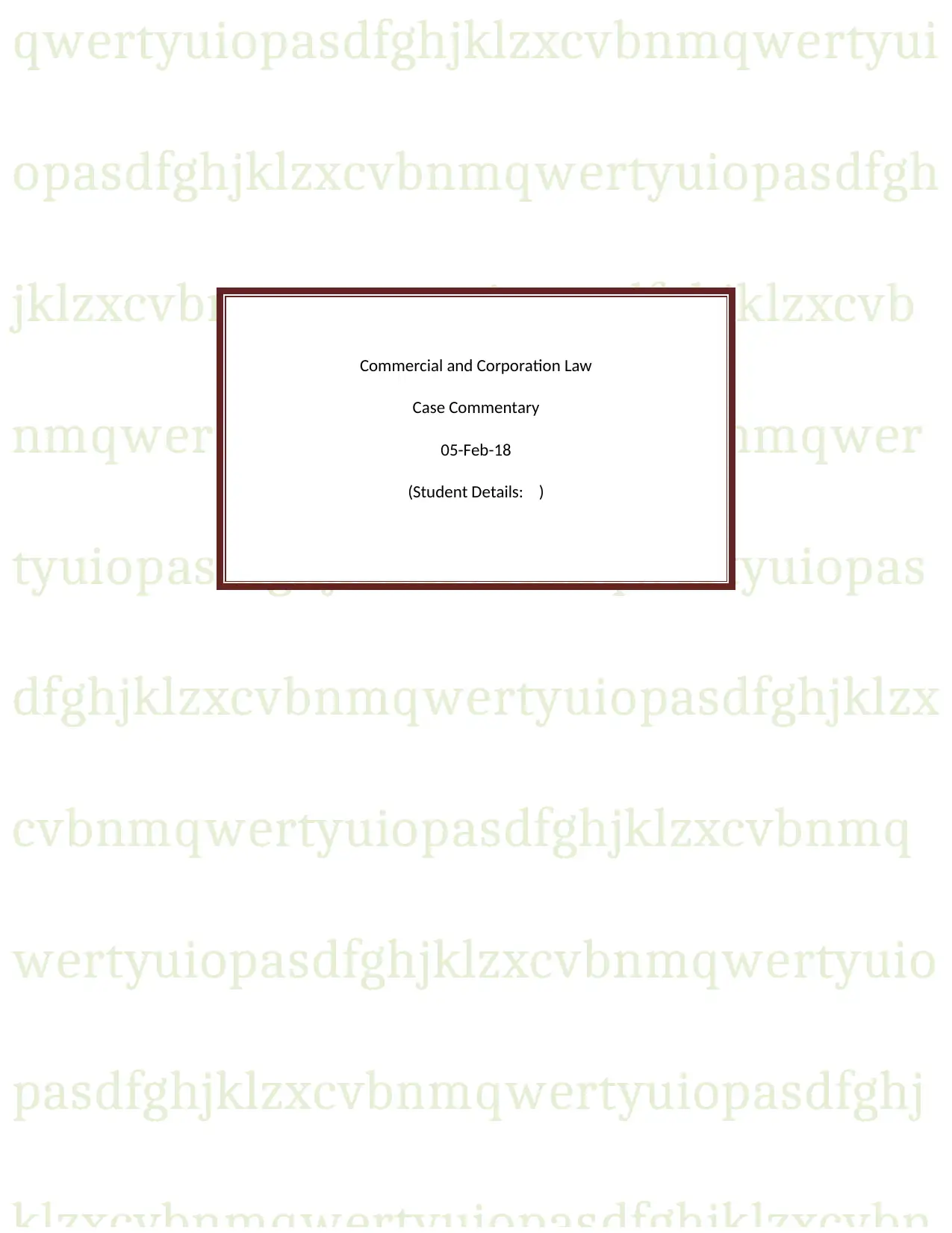
qwertyuiopasdfghjklzxcvbnmqwertyui
opasdfghjklzxcvbnmqwertyuiopasdfgh
jklzxcvbnmqwertyuiopasdfghjklzxcvb
nmqwertyuiopasdfghjklzxcvbnmqwer
tyuiopasdfghjklzxcvbnmqwertyuiopas
dfghjklzxcvbnmqwertyuiopasdfghjklzx
cvbnmqwertyuiopasdfghjklzxcvbnmq
wertyuiopasdfghjklzxcvbnmqwertyuio
pasdfghjklzxcvbnmqwertyuiopasdfghj
Commercial and Corporation Law
Case Commentary
05-Feb-18
(Student Details: )
opasdfghjklzxcvbnmqwertyuiopasdfgh
jklzxcvbnmqwertyuiopasdfghjklzxcvb
nmqwertyuiopasdfghjklzxcvbnmqwer
tyuiopasdfghjklzxcvbnmqwertyuiopas
dfghjklzxcvbnmqwertyuiopasdfghjklzx
cvbnmqwertyuiopasdfghjklzxcvbnmq
wertyuiopasdfghjklzxcvbnmqwertyuio
pasdfghjklzxcvbnmqwertyuiopasdfghj
Commercial and Corporation Law
Case Commentary
05-Feb-18
(Student Details: )
Paraphrase This Document
Need a fresh take? Get an instant paraphrase of this document with our AI Paraphraser
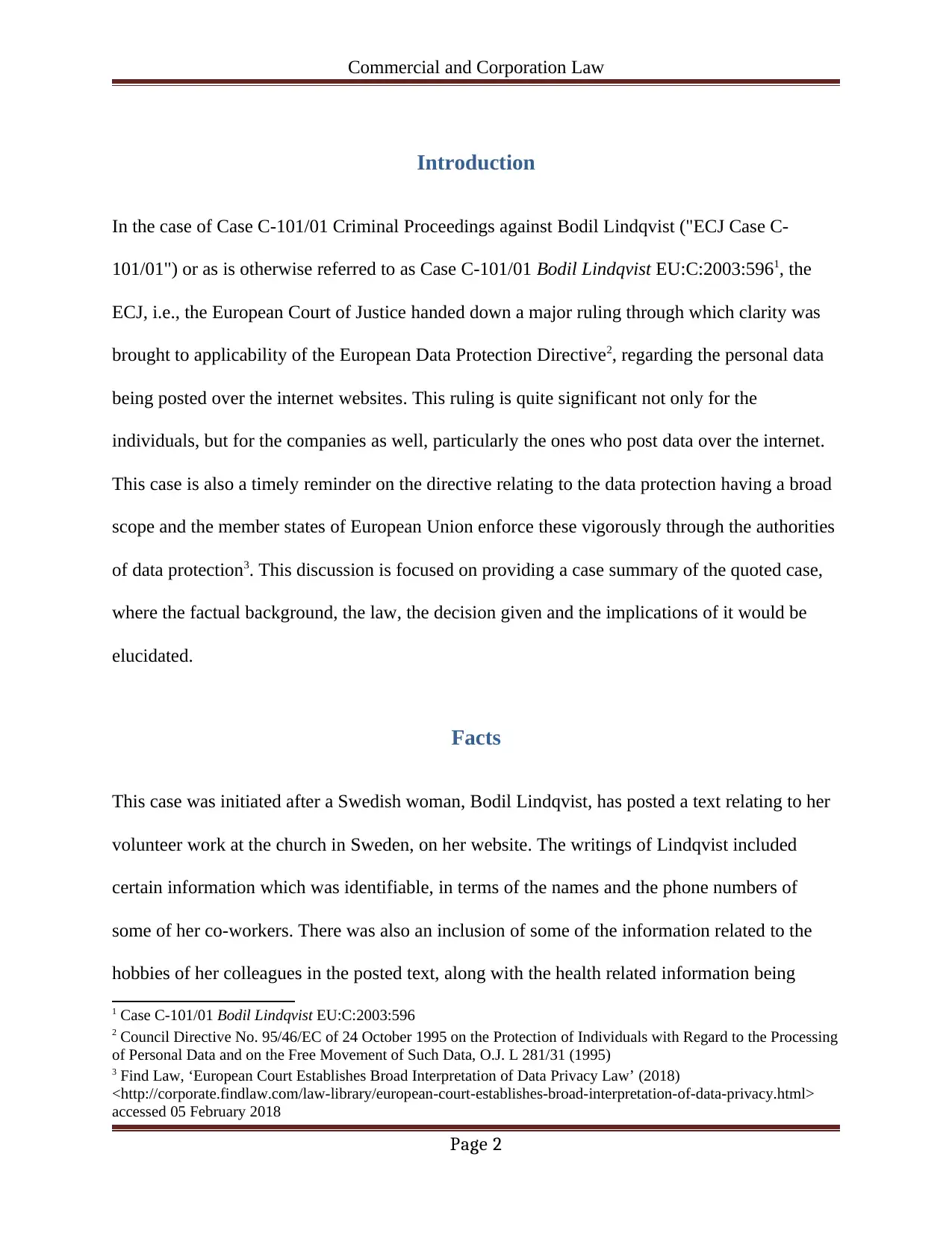
Commercial and Corporation Law
Introduction
In the case of Case C-101/01 Criminal Proceedings against Bodil Lindqvist ("ECJ Case C-
101/01") or as is otherwise referred to as Case C-101/01 Bodil Lindqvist EU:C:2003:5961, the
ECJ, i.e., the European Court of Justice handed down a major ruling through which clarity was
brought to applicability of the European Data Protection Directive2, regarding the personal data
being posted over the internet websites. This ruling is quite significant not only for the
individuals, but for the companies as well, particularly the ones who post data over the internet.
This case is also a timely reminder on the directive relating to the data protection having a broad
scope and the member states of European Union enforce these vigorously through the authorities
of data protection3. This discussion is focused on providing a case summary of the quoted case,
where the factual background, the law, the decision given and the implications of it would be
elucidated.
Facts
This case was initiated after a Swedish woman, Bodil Lindqvist, has posted a text relating to her
volunteer work at the church in Sweden, on her website. The writings of Lindqvist included
certain information which was identifiable, in terms of the names and the phone numbers of
some of her co-workers. There was also an inclusion of some of the information related to the
hobbies of her colleagues in the posted text, along with the health related information being
1 Case C-101/01 Bodil Lindqvist EU:C:2003:596
2 Council Directive No. 95/46/EC of 24 October 1995 on the Protection of Individuals with Regard to the Processing
of Personal Data and on the Free Movement of Such Data, O.J. L 281/31 (1995)
3 Find Law, ‘European Court Establishes Broad Interpretation of Data Privacy Law’ (2018)
<http://corporate.findlaw.com/law-library/european-court-establishes-broad-interpretation-of-data-privacy.html>
accessed 05 February 2018
Page 2
Introduction
In the case of Case C-101/01 Criminal Proceedings against Bodil Lindqvist ("ECJ Case C-
101/01") or as is otherwise referred to as Case C-101/01 Bodil Lindqvist EU:C:2003:5961, the
ECJ, i.e., the European Court of Justice handed down a major ruling through which clarity was
brought to applicability of the European Data Protection Directive2, regarding the personal data
being posted over the internet websites. This ruling is quite significant not only for the
individuals, but for the companies as well, particularly the ones who post data over the internet.
This case is also a timely reminder on the directive relating to the data protection having a broad
scope and the member states of European Union enforce these vigorously through the authorities
of data protection3. This discussion is focused on providing a case summary of the quoted case,
where the factual background, the law, the decision given and the implications of it would be
elucidated.
Facts
This case was initiated after a Swedish woman, Bodil Lindqvist, has posted a text relating to her
volunteer work at the church in Sweden, on her website. The writings of Lindqvist included
certain information which was identifiable, in terms of the names and the phone numbers of
some of her co-workers. There was also an inclusion of some of the information related to the
hobbies of her colleagues in the posted text, along with the health related information being
1 Case C-101/01 Bodil Lindqvist EU:C:2003:596
2 Council Directive No. 95/46/EC of 24 October 1995 on the Protection of Individuals with Regard to the Processing
of Personal Data and on the Free Movement of Such Data, O.J. L 281/31 (1995)
3 Find Law, ‘European Court Establishes Broad Interpretation of Data Privacy Law’ (2018)
<http://corporate.findlaw.com/law-library/european-court-establishes-broad-interpretation-of-data-privacy.html>
accessed 05 February 2018
Page 2
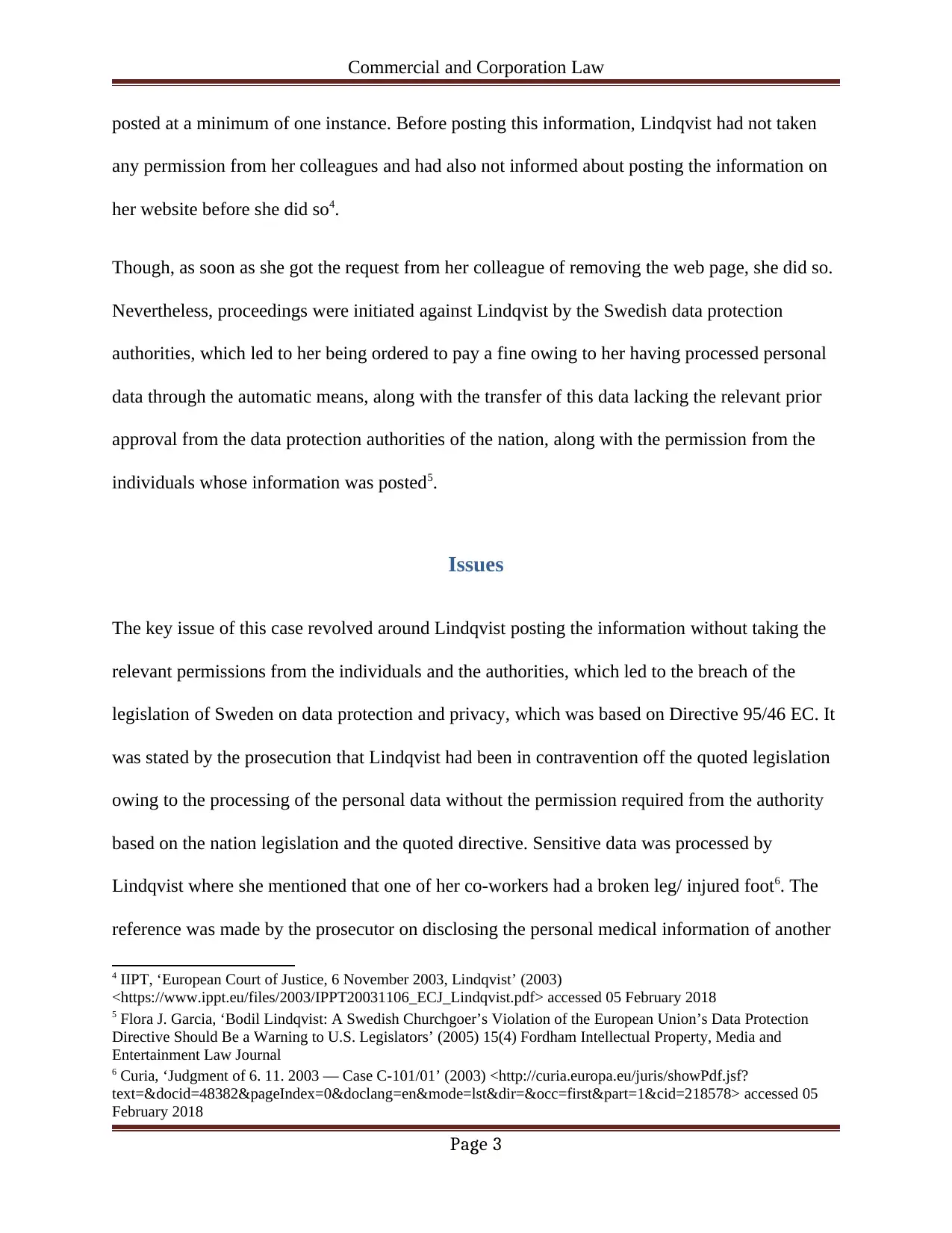
Commercial and Corporation Law
posted at a minimum of one instance. Before posting this information, Lindqvist had not taken
any permission from her colleagues and had also not informed about posting the information on
her website before she did so4.
Though, as soon as she got the request from her colleague of removing the web page, she did so.
Nevertheless, proceedings were initiated against Lindqvist by the Swedish data protection
authorities, which led to her being ordered to pay a fine owing to her having processed personal
data through the automatic means, along with the transfer of this data lacking the relevant prior
approval from the data protection authorities of the nation, along with the permission from the
individuals whose information was posted5.
Issues
The key issue of this case revolved around Lindqvist posting the information without taking the
relevant permissions from the individuals and the authorities, which led to the breach of the
legislation of Sweden on data protection and privacy, which was based on Directive 95/46 EC. It
was stated by the prosecution that Lindqvist had been in contravention off the quoted legislation
owing to the processing of the personal data without the permission required from the authority
based on the nation legislation and the quoted directive. Sensitive data was processed by
Lindqvist where she mentioned that one of her co-workers had a broken leg/ injured foot6. The
reference was made by the prosecutor on disclosing the personal medical information of another
4 IIPT, ‘European Court of Justice, 6 November 2003, Lindqvist’ (2003)
<https://www.ippt.eu/files/2003/IPPT20031106_ECJ_Lindqvist.pdf> accessed 05 February 2018
5 Flora J. Garcia, ‘Bodil Lindqvist: A Swedish Churchgoer’s Violation of the European Union’s Data Protection
Directive Should Be a Warning to U.S. Legislators’ (2005) 15(4) Fordham Intellectual Property, Media and
Entertainment Law Journal
6 Curia, ‘Judgment of 6. 11. 2003 — Case C-101/01’ (2003) <http://curia.europa.eu/juris/showPdf.jsf?
text=&docid=48382&pageIndex=0&doclang=en&mode=lst&dir=&occ=first&part=1&cid=218578> accessed 05
February 2018
Page 3
posted at a minimum of one instance. Before posting this information, Lindqvist had not taken
any permission from her colleagues and had also not informed about posting the information on
her website before she did so4.
Though, as soon as she got the request from her colleague of removing the web page, she did so.
Nevertheless, proceedings were initiated against Lindqvist by the Swedish data protection
authorities, which led to her being ordered to pay a fine owing to her having processed personal
data through the automatic means, along with the transfer of this data lacking the relevant prior
approval from the data protection authorities of the nation, along with the permission from the
individuals whose information was posted5.
Issues
The key issue of this case revolved around Lindqvist posting the information without taking the
relevant permissions from the individuals and the authorities, which led to the breach of the
legislation of Sweden on data protection and privacy, which was based on Directive 95/46 EC. It
was stated by the prosecution that Lindqvist had been in contravention off the quoted legislation
owing to the processing of the personal data without the permission required from the authority
based on the nation legislation and the quoted directive. Sensitive data was processed by
Lindqvist where she mentioned that one of her co-workers had a broken leg/ injured foot6. The
reference was made by the prosecutor on disclosing the personal medical information of another
4 IIPT, ‘European Court of Justice, 6 November 2003, Lindqvist’ (2003)
<https://www.ippt.eu/files/2003/IPPT20031106_ECJ_Lindqvist.pdf> accessed 05 February 2018
5 Flora J. Garcia, ‘Bodil Lindqvist: A Swedish Churchgoer’s Violation of the European Union’s Data Protection
Directive Should Be a Warning to U.S. Legislators’ (2005) 15(4) Fordham Intellectual Property, Media and
Entertainment Law Journal
6 Curia, ‘Judgment of 6. 11. 2003 — Case C-101/01’ (2003) <http://curia.europa.eu/juris/showPdf.jsf?
text=&docid=48382&pageIndex=0&doclang=en&mode=lst&dir=&occ=first&part=1&cid=218578> accessed 05
February 2018
Page 3
⊘ This is a preview!⊘
Do you want full access?
Subscribe today to unlock all pages.

Trusted by 1+ million students worldwide
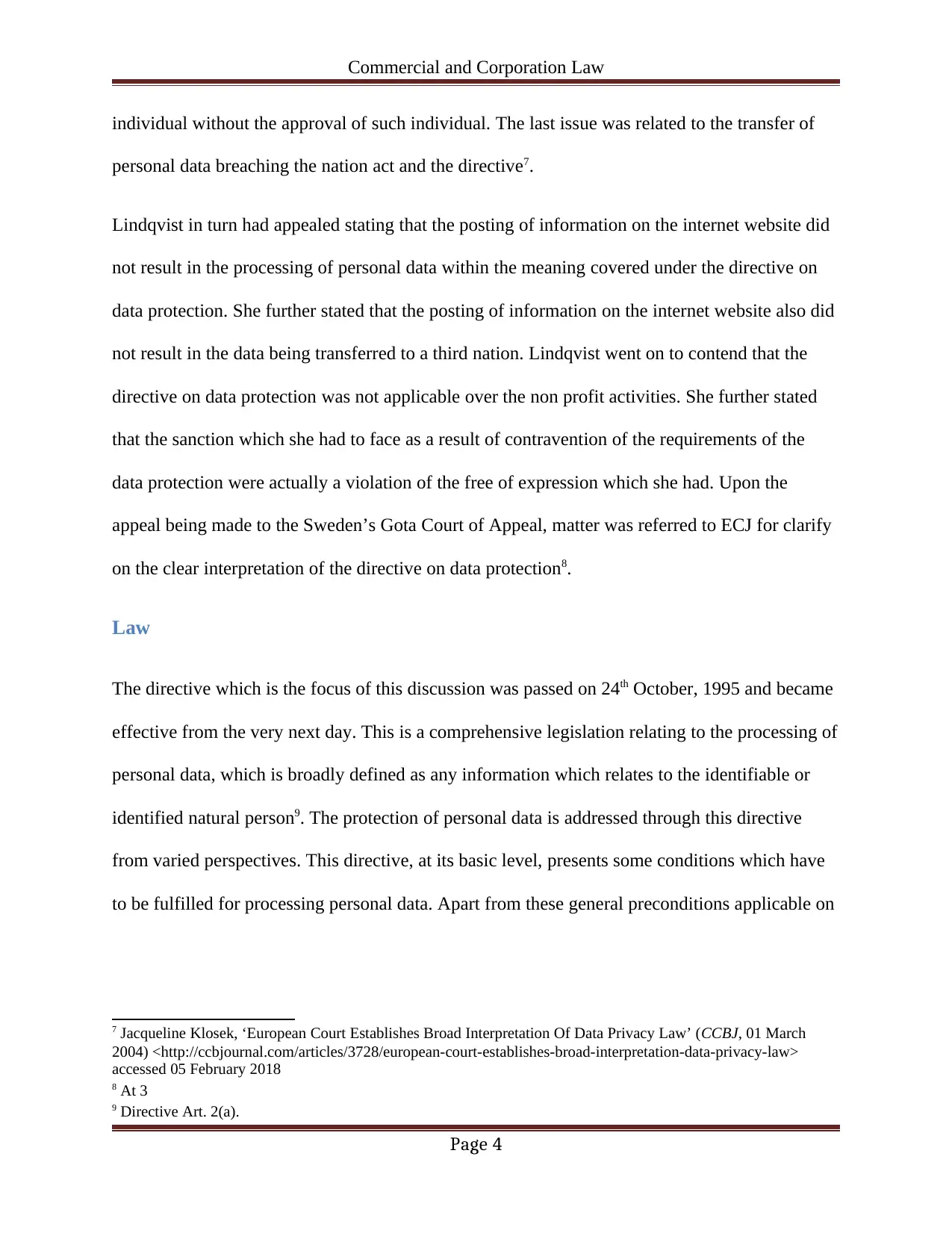
Commercial and Corporation Law
individual without the approval of such individual. The last issue was related to the transfer of
personal data breaching the nation act and the directive7.
Lindqvist in turn had appealed stating that the posting of information on the internet website did
not result in the processing of personal data within the meaning covered under the directive on
data protection. She further stated that the posting of information on the internet website also did
not result in the data being transferred to a third nation. Lindqvist went on to contend that the
directive on data protection was not applicable over the non profit activities. She further stated
that the sanction which she had to face as a result of contravention of the requirements of the
data protection were actually a violation of the free of expression which she had. Upon the
appeal being made to the Sweden’s Gota Court of Appeal, matter was referred to ECJ for clarify
on the clear interpretation of the directive on data protection8.
Law
The directive which is the focus of this discussion was passed on 24th October, 1995 and became
effective from the very next day. This is a comprehensive legislation relating to the processing of
personal data, which is broadly defined as any information which relates to the identifiable or
identified natural person9. The protection of personal data is addressed through this directive
from varied perspectives. This directive, at its basic level, presents some conditions which have
to be fulfilled for processing personal data. Apart from these general preconditions applicable on
7 Jacqueline Klosek, ‘European Court Establishes Broad Interpretation Of Data Privacy Law’ (CCBJ, 01 March
2004) <http://ccbjournal.com/articles/3728/european-court-establishes-broad-interpretation-data-privacy-law>
accessed 05 February 2018
8 At 3
9 Directive Art. 2(a).
Page 4
individual without the approval of such individual. The last issue was related to the transfer of
personal data breaching the nation act and the directive7.
Lindqvist in turn had appealed stating that the posting of information on the internet website did
not result in the processing of personal data within the meaning covered under the directive on
data protection. She further stated that the posting of information on the internet website also did
not result in the data being transferred to a third nation. Lindqvist went on to contend that the
directive on data protection was not applicable over the non profit activities. She further stated
that the sanction which she had to face as a result of contravention of the requirements of the
data protection were actually a violation of the free of expression which she had. Upon the
appeal being made to the Sweden’s Gota Court of Appeal, matter was referred to ECJ for clarify
on the clear interpretation of the directive on data protection8.
Law
The directive which is the focus of this discussion was passed on 24th October, 1995 and became
effective from the very next day. This is a comprehensive legislation relating to the processing of
personal data, which is broadly defined as any information which relates to the identifiable or
identified natural person9. The protection of personal data is addressed through this directive
from varied perspectives. This directive, at its basic level, presents some conditions which have
to be fulfilled for processing personal data. Apart from these general preconditions applicable on
7 Jacqueline Klosek, ‘European Court Establishes Broad Interpretation Of Data Privacy Law’ (CCBJ, 01 March
2004) <http://ccbjournal.com/articles/3728/european-court-establishes-broad-interpretation-data-privacy-law>
accessed 05 February 2018
8 At 3
9 Directive Art. 2(a).
Page 4
Paraphrase This Document
Need a fresh take? Get an instant paraphrase of this document with our AI Paraphraser
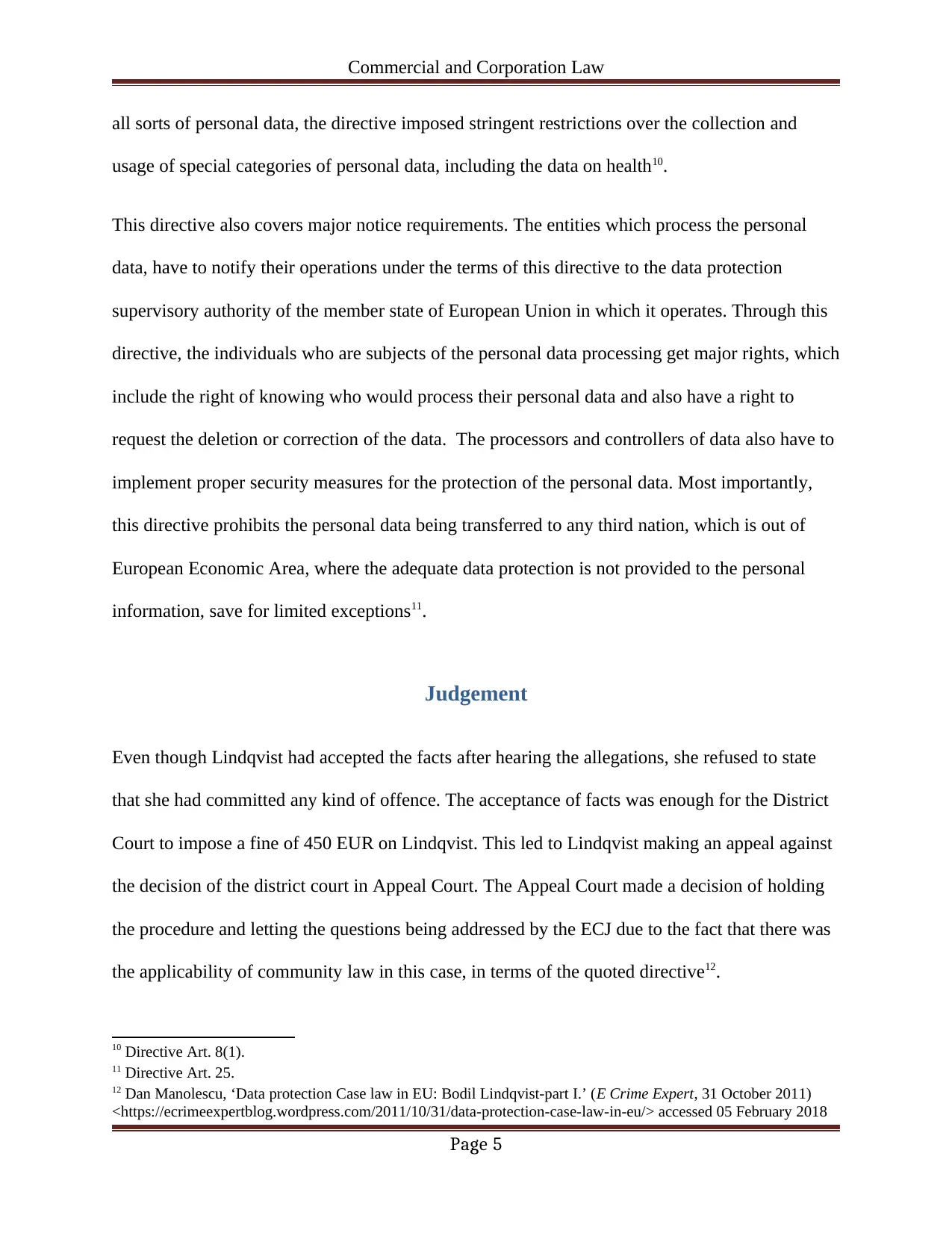
Commercial and Corporation Law
all sorts of personal data, the directive imposed stringent restrictions over the collection and
usage of special categories of personal data, including the data on health10.
This directive also covers major notice requirements. The entities which process the personal
data, have to notify their operations under the terms of this directive to the data protection
supervisory authority of the member state of European Union in which it operates. Through this
directive, the individuals who are subjects of the personal data processing get major rights, which
include the right of knowing who would process their personal data and also have a right to
request the deletion or correction of the data. The processors and controllers of data also have to
implement proper security measures for the protection of the personal data. Most importantly,
this directive prohibits the personal data being transferred to any third nation, which is out of
European Economic Area, where the adequate data protection is not provided to the personal
information, save for limited exceptions11.
Judgement
Even though Lindqvist had accepted the facts after hearing the allegations, she refused to state
that she had committed any kind of offence. The acceptance of facts was enough for the District
Court to impose a fine of 450 EUR on Lindqvist. This led to Lindqvist making an appeal against
the decision of the district court in Appeal Court. The Appeal Court made a decision of holding
the procedure and letting the questions being addressed by the ECJ due to the fact that there was
the applicability of community law in this case, in terms of the quoted directive12.
10 Directive Art. 8(1).
11 Directive Art. 25.
12 Dan Manolescu, ‘Data protection Case law in EU: Bodil Lindqvist-part I.’ (E Crime Expert, 31 October 2011)
<https://ecrimeexpertblog.wordpress.com/2011/10/31/data-protection-case-law-in-eu/> accessed 05 February 2018
Page 5
all sorts of personal data, the directive imposed stringent restrictions over the collection and
usage of special categories of personal data, including the data on health10.
This directive also covers major notice requirements. The entities which process the personal
data, have to notify their operations under the terms of this directive to the data protection
supervisory authority of the member state of European Union in which it operates. Through this
directive, the individuals who are subjects of the personal data processing get major rights, which
include the right of knowing who would process their personal data and also have a right to
request the deletion or correction of the data. The processors and controllers of data also have to
implement proper security measures for the protection of the personal data. Most importantly,
this directive prohibits the personal data being transferred to any third nation, which is out of
European Economic Area, where the adequate data protection is not provided to the personal
information, save for limited exceptions11.
Judgement
Even though Lindqvist had accepted the facts after hearing the allegations, she refused to state
that she had committed any kind of offence. The acceptance of facts was enough for the District
Court to impose a fine of 450 EUR on Lindqvist. This led to Lindqvist making an appeal against
the decision of the district court in Appeal Court. The Appeal Court made a decision of holding
the procedure and letting the questions being addressed by the ECJ due to the fact that there was
the applicability of community law in this case, in terms of the quoted directive12.
10 Directive Art. 8(1).
11 Directive Art. 25.
12 Dan Manolescu, ‘Data protection Case law in EU: Bodil Lindqvist-part I.’ (E Crime Expert, 31 October 2011)
<https://ecrimeexpertblog.wordpress.com/2011/10/31/data-protection-case-law-in-eu/> accessed 05 February 2018
Page 5
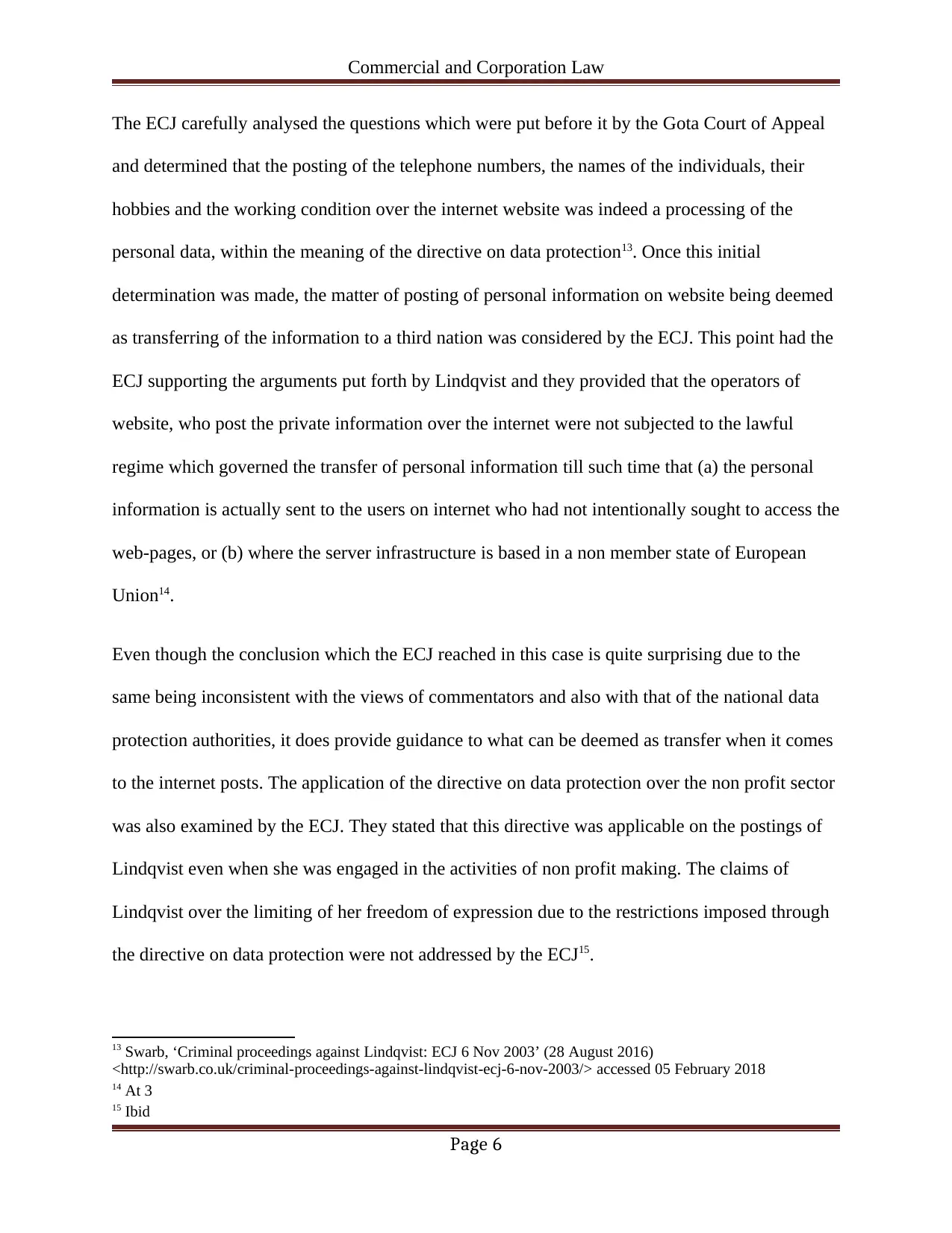
Commercial and Corporation Law
The ECJ carefully analysed the questions which were put before it by the Gota Court of Appeal
and determined that the posting of the telephone numbers, the names of the individuals, their
hobbies and the working condition over the internet website was indeed a processing of the
personal data, within the meaning of the directive on data protection13. Once this initial
determination was made, the matter of posting of personal information on website being deemed
as transferring of the information to a third nation was considered by the ECJ. This point had the
ECJ supporting the arguments put forth by Lindqvist and they provided that the operators of
website, who post the private information over the internet were not subjected to the lawful
regime which governed the transfer of personal information till such time that (a) the personal
information is actually sent to the users on internet who had not intentionally sought to access the
web-pages, or (b) where the server infrastructure is based in a non member state of European
Union14.
Even though the conclusion which the ECJ reached in this case is quite surprising due to the
same being inconsistent with the views of commentators and also with that of the national data
protection authorities, it does provide guidance to what can be deemed as transfer when it comes
to the internet posts. The application of the directive on data protection over the non profit sector
was also examined by the ECJ. They stated that this directive was applicable on the postings of
Lindqvist even when she was engaged in the activities of non profit making. The claims of
Lindqvist over the limiting of her freedom of expression due to the restrictions imposed through
the directive on data protection were not addressed by the ECJ15.
13 Swarb, ‘Criminal proceedings against Lindqvist: ECJ 6 Nov 2003’ (28 August 2016)
<http://swarb.co.uk/criminal-proceedings-against-lindqvist-ecj-6-nov-2003/> accessed 05 February 2018
14 At 3
15 Ibid
Page 6
The ECJ carefully analysed the questions which were put before it by the Gota Court of Appeal
and determined that the posting of the telephone numbers, the names of the individuals, their
hobbies and the working condition over the internet website was indeed a processing of the
personal data, within the meaning of the directive on data protection13. Once this initial
determination was made, the matter of posting of personal information on website being deemed
as transferring of the information to a third nation was considered by the ECJ. This point had the
ECJ supporting the arguments put forth by Lindqvist and they provided that the operators of
website, who post the private information over the internet were not subjected to the lawful
regime which governed the transfer of personal information till such time that (a) the personal
information is actually sent to the users on internet who had not intentionally sought to access the
web-pages, or (b) where the server infrastructure is based in a non member state of European
Union14.
Even though the conclusion which the ECJ reached in this case is quite surprising due to the
same being inconsistent with the views of commentators and also with that of the national data
protection authorities, it does provide guidance to what can be deemed as transfer when it comes
to the internet posts. The application of the directive on data protection over the non profit sector
was also examined by the ECJ. They stated that this directive was applicable on the postings of
Lindqvist even when she was engaged in the activities of non profit making. The claims of
Lindqvist over the limiting of her freedom of expression due to the restrictions imposed through
the directive on data protection were not addressed by the ECJ15.
13 Swarb, ‘Criminal proceedings against Lindqvist: ECJ 6 Nov 2003’ (28 August 2016)
<http://swarb.co.uk/criminal-proceedings-against-lindqvist-ecj-6-nov-2003/> accessed 05 February 2018
14 At 3
15 Ibid
Page 6
⊘ This is a preview!⊘
Do you want full access?
Subscribe today to unlock all pages.

Trusted by 1+ million students worldwide
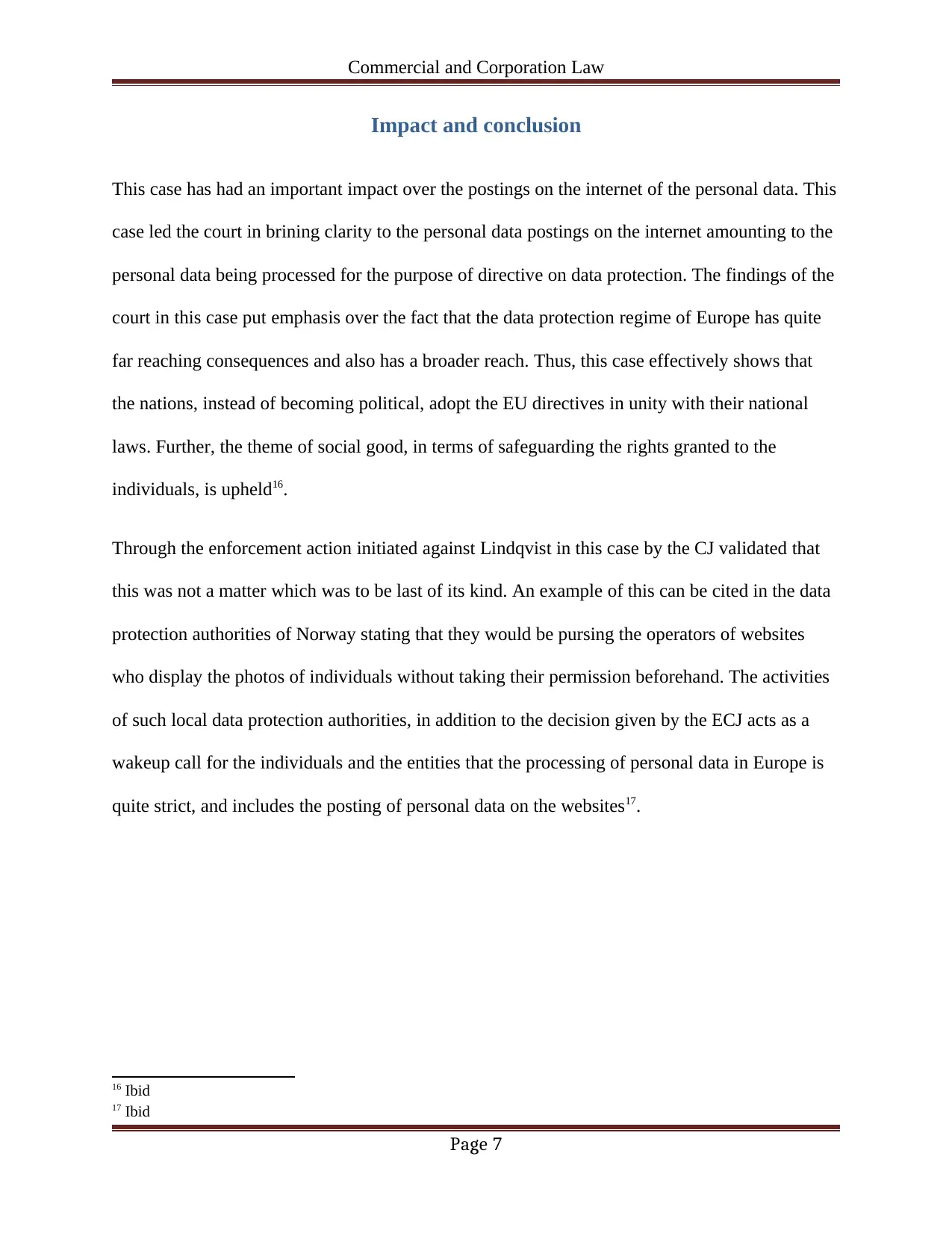
Commercial and Corporation Law
Impact and conclusion
This case has had an important impact over the postings on the internet of the personal data. This
case led the court in brining clarity to the personal data postings on the internet amounting to the
personal data being processed for the purpose of directive on data protection. The findings of the
court in this case put emphasis over the fact that the data protection regime of Europe has quite
far reaching consequences and also has a broader reach. Thus, this case effectively shows that
the nations, instead of becoming political, adopt the EU directives in unity with their national
laws. Further, the theme of social good, in terms of safeguarding the rights granted to the
individuals, is upheld16.
Through the enforcement action initiated against Lindqvist in this case by the CJ validated that
this was not a matter which was to be last of its kind. An example of this can be cited in the data
protection authorities of Norway stating that they would be pursing the operators of websites
who display the photos of individuals without taking their permission beforehand. The activities
of such local data protection authorities, in addition to the decision given by the ECJ acts as a
wakeup call for the individuals and the entities that the processing of personal data in Europe is
quite strict, and includes the posting of personal data on the websites17.
16 Ibid
17 Ibid
Page 7
Impact and conclusion
This case has had an important impact over the postings on the internet of the personal data. This
case led the court in brining clarity to the personal data postings on the internet amounting to the
personal data being processed for the purpose of directive on data protection. The findings of the
court in this case put emphasis over the fact that the data protection regime of Europe has quite
far reaching consequences and also has a broader reach. Thus, this case effectively shows that
the nations, instead of becoming political, adopt the EU directives in unity with their national
laws. Further, the theme of social good, in terms of safeguarding the rights granted to the
individuals, is upheld16.
Through the enforcement action initiated against Lindqvist in this case by the CJ validated that
this was not a matter which was to be last of its kind. An example of this can be cited in the data
protection authorities of Norway stating that they would be pursing the operators of websites
who display the photos of individuals without taking their permission beforehand. The activities
of such local data protection authorities, in addition to the decision given by the ECJ acts as a
wakeup call for the individuals and the entities that the processing of personal data in Europe is
quite strict, and includes the posting of personal data on the websites17.
16 Ibid
17 Ibid
Page 7
Paraphrase This Document
Need a fresh take? Get an instant paraphrase of this document with our AI Paraphraser
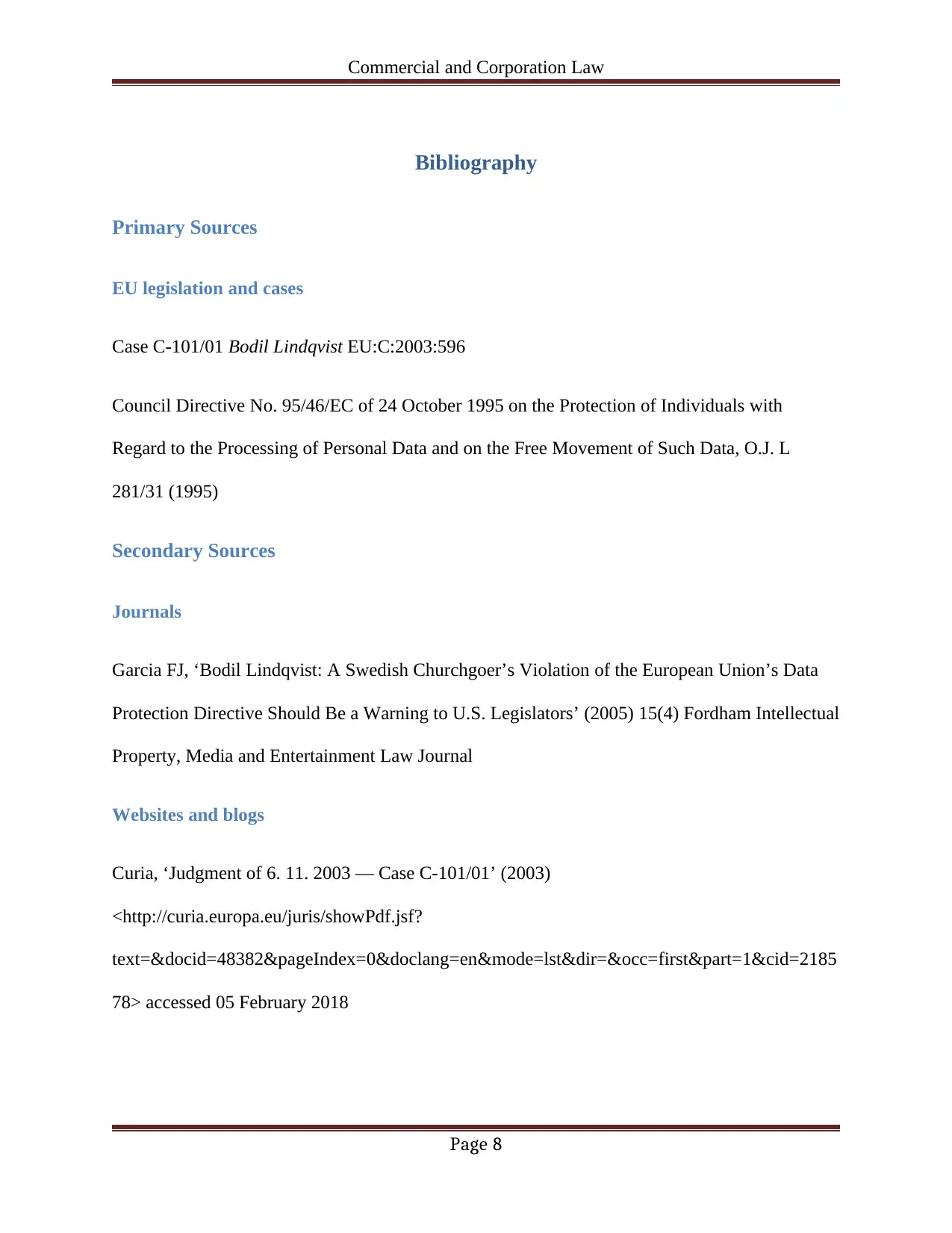
Commercial and Corporation Law
Bibliography
Primary Sources
EU legislation and cases
Case C-101/01 Bodil Lindqvist EU:C:2003:596
Council Directive No. 95/46/EC of 24 October 1995 on the Protection of Individuals with
Regard to the Processing of Personal Data and on the Free Movement of Such Data, O.J. L
281/31 (1995)
Secondary Sources
Journals
Garcia FJ, ‘Bodil Lindqvist: A Swedish Churchgoer’s Violation of the European Union’s Data
Protection Directive Should Be a Warning to U.S. Legislators’ (2005) 15(4) Fordham Intellectual
Property, Media and Entertainment Law Journal
Websites and blogs
Curia, ‘Judgment of 6. 11. 2003 — Case C-101/01’ (2003)
<http://curia.europa.eu/juris/showPdf.jsf?
text=&docid=48382&pageIndex=0&doclang=en&mode=lst&dir=&occ=first&part=1&cid=2185
78> accessed 05 February 2018
Page 8
Bibliography
Primary Sources
EU legislation and cases
Case C-101/01 Bodil Lindqvist EU:C:2003:596
Council Directive No. 95/46/EC of 24 October 1995 on the Protection of Individuals with
Regard to the Processing of Personal Data and on the Free Movement of Such Data, O.J. L
281/31 (1995)
Secondary Sources
Journals
Garcia FJ, ‘Bodil Lindqvist: A Swedish Churchgoer’s Violation of the European Union’s Data
Protection Directive Should Be a Warning to U.S. Legislators’ (2005) 15(4) Fordham Intellectual
Property, Media and Entertainment Law Journal
Websites and blogs
Curia, ‘Judgment of 6. 11. 2003 — Case C-101/01’ (2003)
<http://curia.europa.eu/juris/showPdf.jsf?
text=&docid=48382&pageIndex=0&doclang=en&mode=lst&dir=&occ=first&part=1&cid=2185
78> accessed 05 February 2018
Page 8
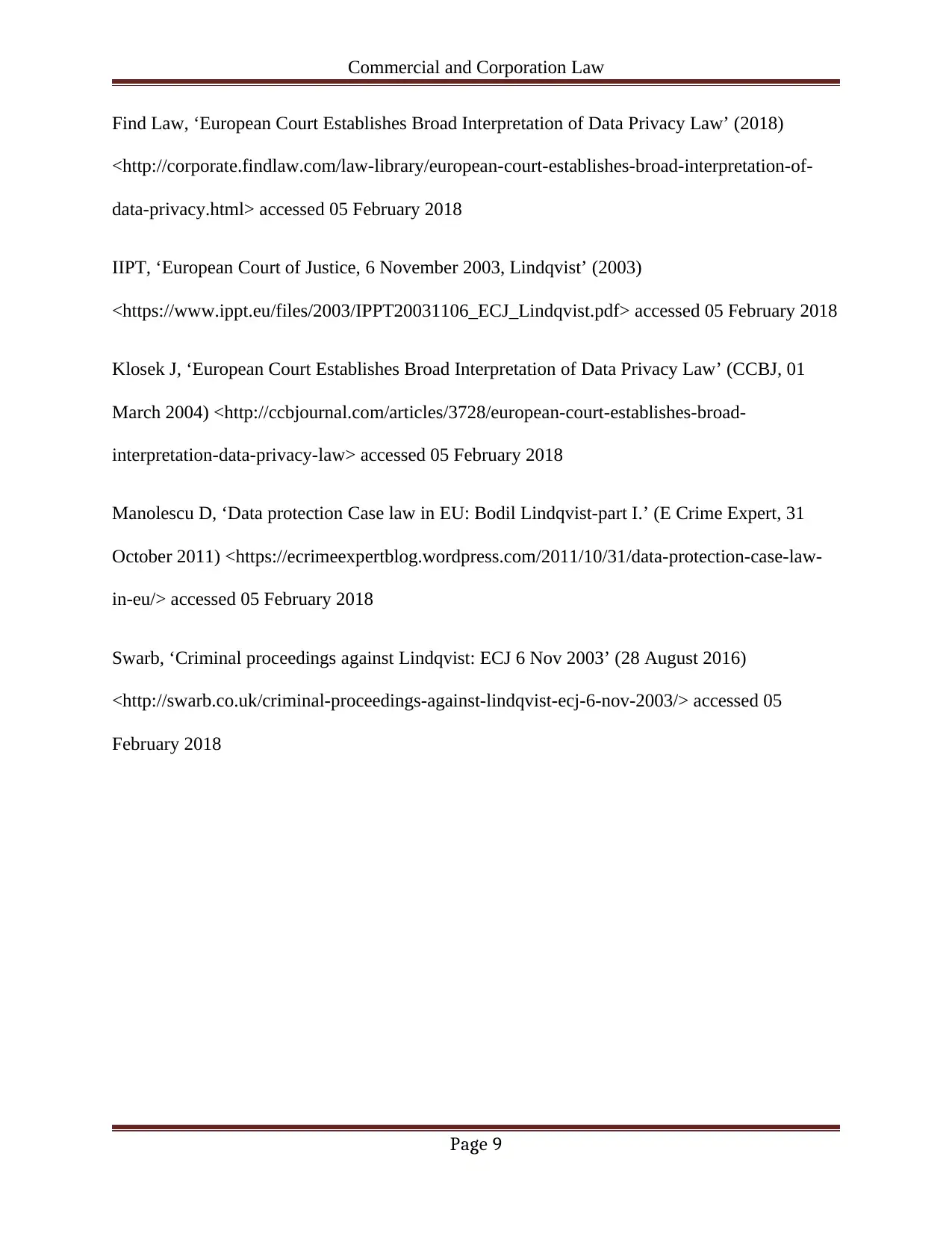
Commercial and Corporation Law
Find Law, ‘European Court Establishes Broad Interpretation of Data Privacy Law’ (2018)
<http://corporate.findlaw.com/law-library/european-court-establishes-broad-interpretation-of-
data-privacy.html> accessed 05 February 2018
IIPT, ‘European Court of Justice, 6 November 2003, Lindqvist’ (2003)
<https://www.ippt.eu/files/2003/IPPT20031106_ECJ_Lindqvist.pdf> accessed 05 February 2018
Klosek J, ‘European Court Establishes Broad Interpretation of Data Privacy Law’ (CCBJ, 01
March 2004) <http://ccbjournal.com/articles/3728/european-court-establishes-broad-
interpretation-data-privacy-law> accessed 05 February 2018
Manolescu D, ‘Data protection Case law in EU: Bodil Lindqvist-part I.’ (E Crime Expert, 31
October 2011) <https://ecrimeexpertblog.wordpress.com/2011/10/31/data-protection-case-law-
in-eu/> accessed 05 February 2018
Swarb, ‘Criminal proceedings against Lindqvist: ECJ 6 Nov 2003’ (28 August 2016)
<http://swarb.co.uk/criminal-proceedings-against-lindqvist-ecj-6-nov-2003/> accessed 05
February 2018
Page 9
Find Law, ‘European Court Establishes Broad Interpretation of Data Privacy Law’ (2018)
<http://corporate.findlaw.com/law-library/european-court-establishes-broad-interpretation-of-
data-privacy.html> accessed 05 February 2018
IIPT, ‘European Court of Justice, 6 November 2003, Lindqvist’ (2003)
<https://www.ippt.eu/files/2003/IPPT20031106_ECJ_Lindqvist.pdf> accessed 05 February 2018
Klosek J, ‘European Court Establishes Broad Interpretation of Data Privacy Law’ (CCBJ, 01
March 2004) <http://ccbjournal.com/articles/3728/european-court-establishes-broad-
interpretation-data-privacy-law> accessed 05 February 2018
Manolescu D, ‘Data protection Case law in EU: Bodil Lindqvist-part I.’ (E Crime Expert, 31
October 2011) <https://ecrimeexpertblog.wordpress.com/2011/10/31/data-protection-case-law-
in-eu/> accessed 05 February 2018
Swarb, ‘Criminal proceedings against Lindqvist: ECJ 6 Nov 2003’ (28 August 2016)
<http://swarb.co.uk/criminal-proceedings-against-lindqvist-ecj-6-nov-2003/> accessed 05
February 2018
Page 9
⊘ This is a preview!⊘
Do you want full access?
Subscribe today to unlock all pages.

Trusted by 1+ million students worldwide
1 out of 9
Your All-in-One AI-Powered Toolkit for Academic Success.
+13062052269
info@desklib.com
Available 24*7 on WhatsApp / Email
![[object Object]](/_next/static/media/star-bottom.7253800d.svg)
Unlock your academic potential
Copyright © 2020–2025 A2Z Services. All Rights Reserved. Developed and managed by ZUCOL.